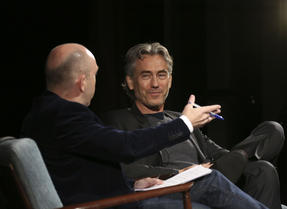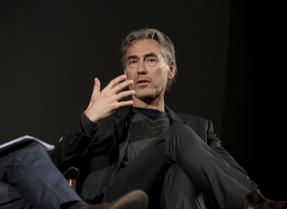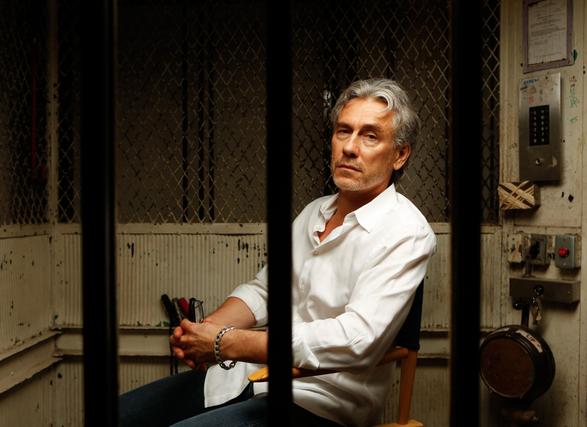In the penultimate lecture of the series, Tony Gilroy (the Bourne franchise, Michael Clayton) delivered an illuminating insight into his craft that was as fast-paced and authoritative as the films he is responsible for.
Listen to the Lecture:
Listen to the Q&A:
Free BAFTA Podcasts on iTunes & SoundCloud
Subscribe to BAFTA on iTunes and BAFTA on SoundCloud to receive all the latest audio from BAFTA's year-round events programme.
Launch BAFTA on the iTunes Store (requires iTunes)
Go to BAFTA on SoundCloud
Screenwriters' Roundup Podcast
Read the Lecture:
Download Tony Gilroy's Screenwriters' Lecture Transcript to read in full.
Tony Gilroy's Screenwriters' Lecture (219.5 KB)
 BAFTA/ Stephen ButlerGilroy opened the lecture by drawing on his roots, noting how his father, brother and close friends are screenwriters and although he only “went to college for fifteen minutes”, his life has been structured around “making stuff up that people do in front of cameras”. Following years as a musician working collaboratively in various bands, Gilroy did “the second bravest thing” he has done in his life and quit music, worked in bars for five or six years in which time he developed his craft and went on to sell his first script for The Cutting Edge at the age of thirty.
BAFTA/ Stephen ButlerGilroy opened the lecture by drawing on his roots, noting how his father, brother and close friends are screenwriters and although he only “went to college for fifteen minutes”, his life has been structured around “making stuff up that people do in front of cameras”. Following years as a musician working collaboratively in various bands, Gilroy did “the second bravest thing” he has done in his life and quit music, worked in bars for five or six years in which time he developed his craft and went on to sell his first script for The Cutting Edge at the age of thirty.
Establishing original screenplays as the lecture’s focus, Gilroy emphasized the importance of innate creativity and innovation. “We make stuff up”, he insisted; “there’s a level of romance and imagination to this that isn’t found in any screenwriting book or seminar”. The starting point for Gilroy needs to be something small and specific that can be elaborated and built upon. Whether it is “a character, a moment in time, a point in history”, the script needs one precise kernel from which everything else stems.
Showing a clip from legal thriller Michael Clayton, Gilroy approached the development of story and the centrality of two facets: dialogue and character. Gilroy was explicit in defining “human behaviour” as the “deal breaker” for a screenplay: “whether you’re writing orcs or Anne Boleyn, it makes no difference”, Gilroy asserted, “the quality of your writing is absolutely capped by your understanding of human behaviour”.
The quality of your writing is absolutely capped by your understanding of human behaviour
Language proved the ultimate medium for Gilroy, who expressed how “the characters have to rise and it has to come from dialogue for me”. Highlighting this point with a scene from The Bourne Identity, Gilroy progressed to the importance of making the screenplay realistic, stating that “you need to become a journalist for the movie that’s inside your head”.
 BAFTA/ Stephen ButlerDescribing his process for writing the outline, (“the faster you can do it the better”), and then the script itself, (“it really is fun”), the audience were treated to an in-depth insight into Gilroy’s methodology. “I have to sit down at the keyboard and talk to myself” observed the writer who defined the dichotomy of facing his desk as being either “terrified to be there or can’t wait to be there”, as honest about the brutality of his craft as the fun he has with it.
BAFTA/ Stephen ButlerDescribing his process for writing the outline, (“the faster you can do it the better”), and then the script itself, (“it really is fun”), the audience were treated to an in-depth insight into Gilroy’s methodology. “I have to sit down at the keyboard and talk to myself” observed the writer who defined the dichotomy of facing his desk as being either “terrified to be there or can’t wait to be there”, as honest about the brutality of his craft as the fun he has with it.
Discussion into the editing stage followed, as Gilroy defined his allegiance to aesthetics as an unusual way to edit: “I like things to be pretty”. If, for example, a single line from a speech runs over past the page, something has to be cut. While perhaps a rare way to edit, Gilroy draws his confidence from experience, conveying how “the more movies you make, the less dialogue you write and the tighter it will be”.
While both the agonising challenge and the sheer joy of screenwriting were vividly expressed, Gilroy ended the lecture with reference to his recent experiences as a writer/director, suggesting that although he wished he’d directed years earlier, “there’s no day of directing that trumps a great day of writing”.
 BAFTA/ Craig Blankenhorn
BAFTA/ Craig Blankenhorn





